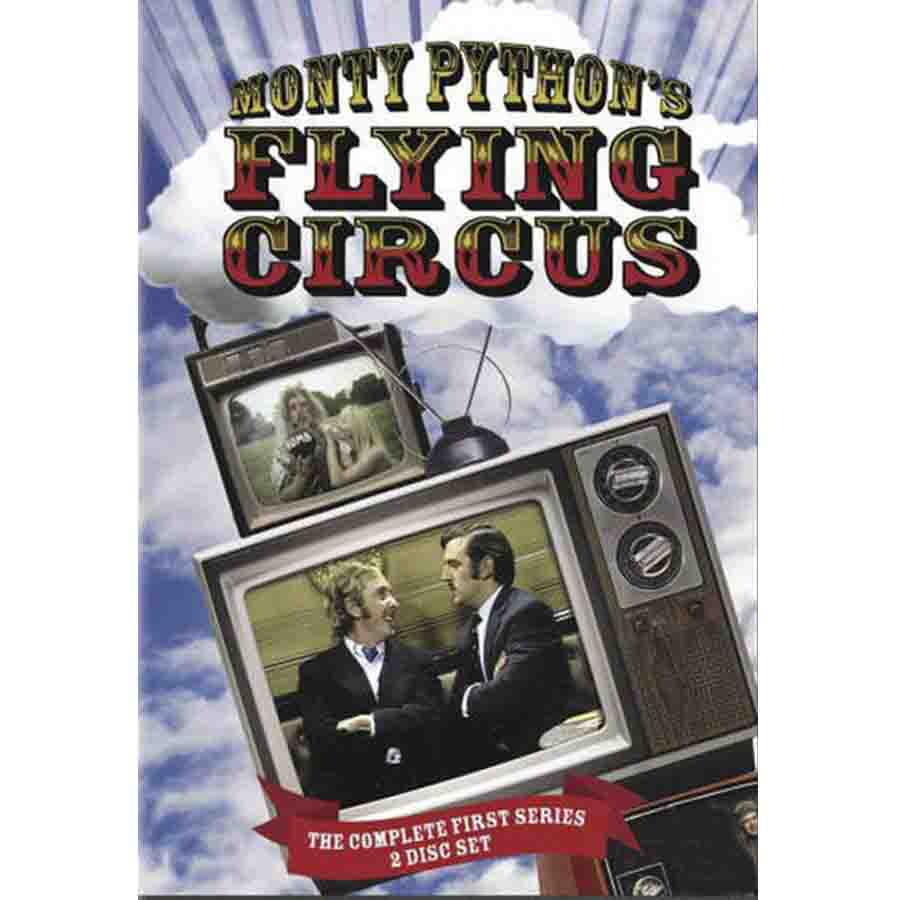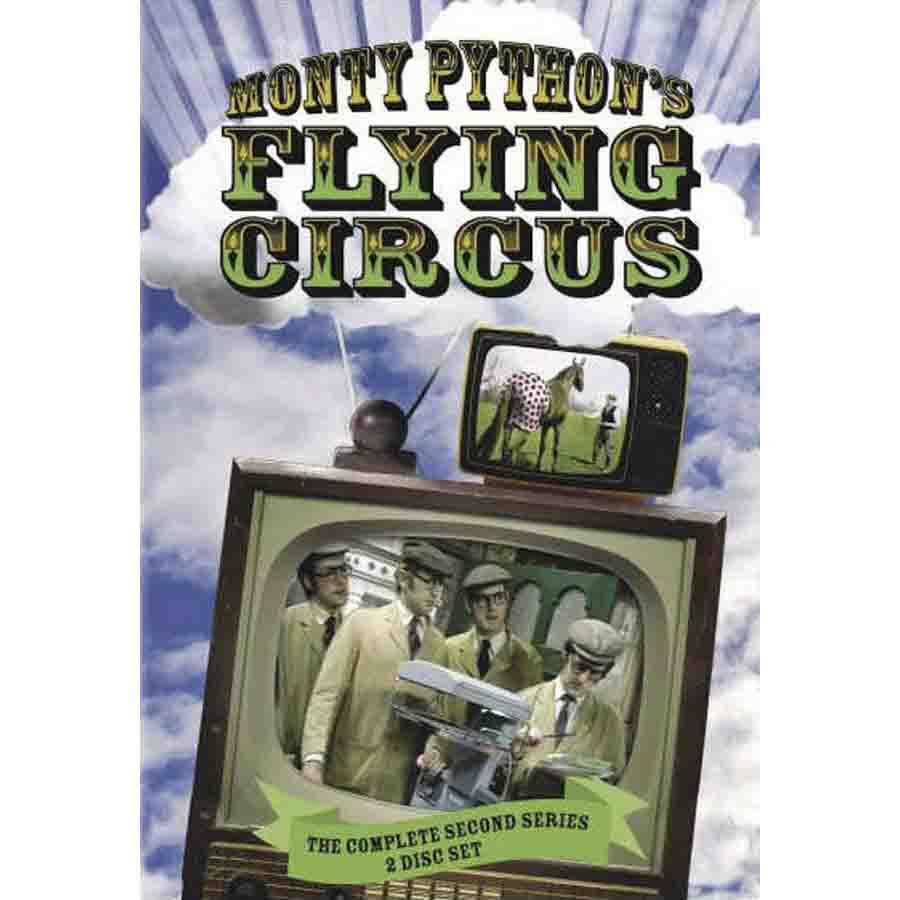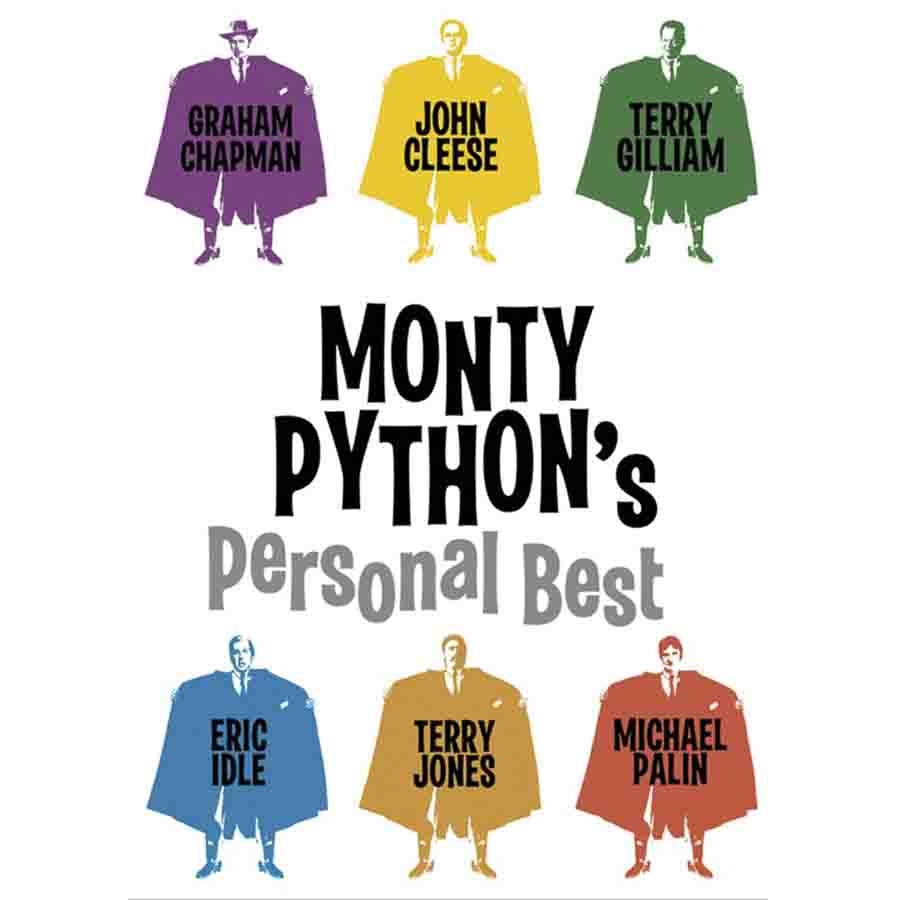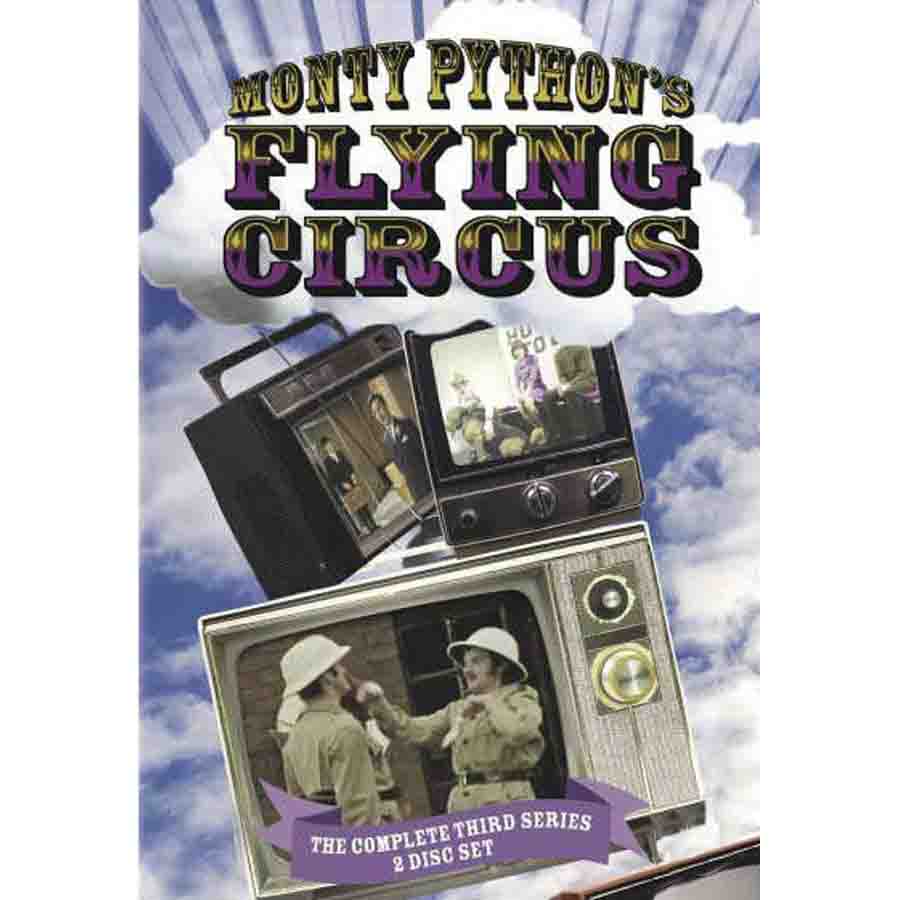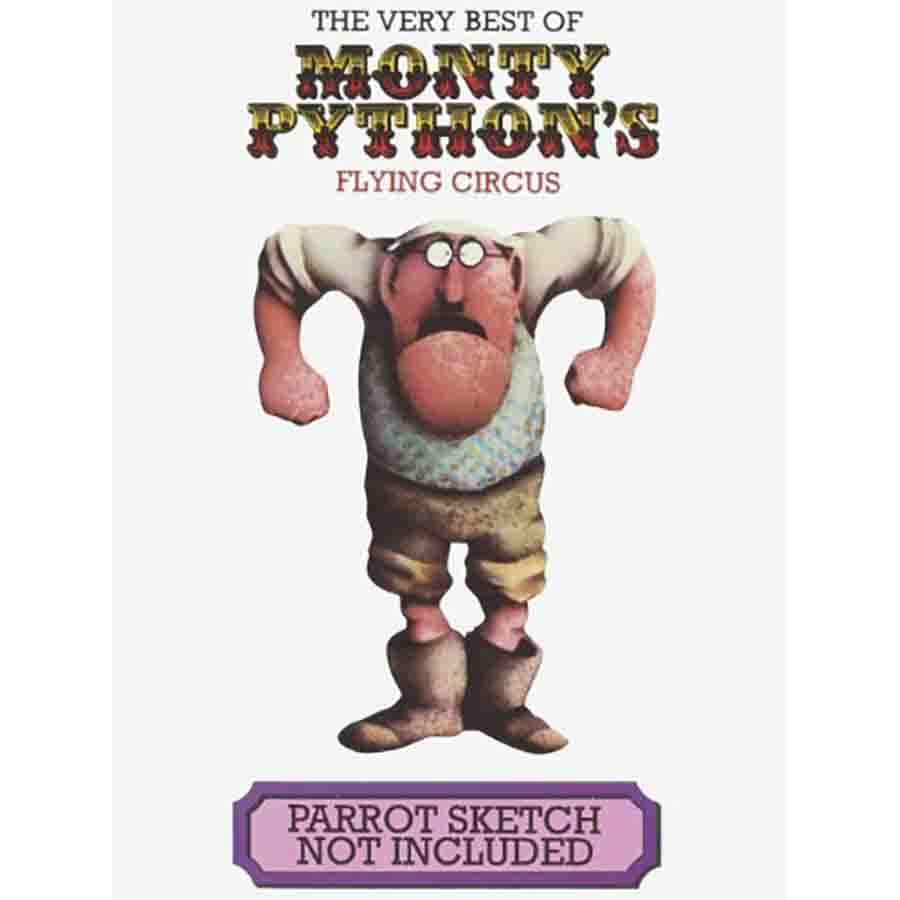Monty Python's Flying Circus, Series 1
"Monty Python's Flying Circus, Series 1"
Director/Producer: John Howard Davies (shows 1-4); Ian MacNaughton (shows 5-13)
Broadcast on BBC1
From the very beginning, "Monty Python's Flying Circus" demonstrated quite clearly that the group's six members were after something quite uncategorizable. The first episode broadcast presented a surreal mix of violence (Wolfgang Amadeus Mozart hosts a program depicting famous deaths), TV commercial and interview programme parodies, bizarre cut-out animations, and a shout-out to titans of modern art – all linked by pigs.
Series Highlights
Episode 1, "Whither Canada?" (Original air date: 5 Oct. 1969) – Famous Deaths; Italian Lesson; Whizzo Butter; Arthur "Two Sheds" Jackson; Picasso/Cycling Race; The Funniest Joke in the World
Episode 2, "Sex and Violence" (Original air date: 12 Oct. 1969) – Flying Sheep (With French Lecture); A Man With Three Buttocks; The Mouse Organ; Marriage Guidance Counselor; Working-Class Playwright; "Epilogue": Wresting to Determine the Existence of God; Carnivorous Pram and Rodin's Kiss; The Mouse Problem
Episode 3, "How to Recognize Different Types of Trees From Quite a Long Way Away" (Original air date: 19 Oct. 1969) – The Larch; Courtroom Sketch; Bicycle Repairman; Storytime; Dirty Fork Sketch; Seduced Milkmen; Stolen Newsreader; Children's Interview; Nudge Nudge
Episode 4, "Owl-Stretching Time" (Original air date: 26 Oct. 1969) – Art Gallery; Undressing in Public; Self-Defense Against Fresh Fruit; Secret Service Dentists
Episode 5, "Man's Crisis of Identity in the Latter Half of the Twentieth Century" (Original air date: 16 Nov. 1969) – Confuse-A-Cat; The Smuggler; An Interview With a Duck, a Cat, and a Lizard; Police Raid; Newsreader Arrest; "Match of the Day"; Job Interview; Burglar/Encyclopedia Salesman
Episode 6 [No episode title] (Original air date: 23 Nov. 1969) – Johann Gambolputty … of Ulm; Vox Pops; Whizzo Chocolate; The Dull Life of a City Stockbroker; Red Indian in Theatre; 20th Century Vole
Episode 7, "You're No Fun Any More" (Original air date: 30 Nov. 1969) – Camel Spotting; The Audit; The Blancmange, From Andromeda to WImbledon
Episode 8, "Full Frontal Nudity" (Original air date: 7 Dec. 1969) – Army Protection Racket; Vox Pops; Art Critic; Buying a Bed; Hermits; Dead Parrot; The Flasher; Hell's Grannies
Episode 9, "The Ant, an Introduction" (Original air date: 14 Dec. 1969) – Llamas; A Man With a Tape Recorder Up His Nose; Mountaineering Expedition; The Lumberjack Song; Gumby Crooner; The Refreshment Room at Bletchley; The Hunting Party; The Visitors
Episode 10 [No episode title] (Original air date: 21 Dec. 1969) – Walk-on Role; Robbing a Lingerie Shop; Arthur Tree; Vocational Guidance Counselor; The First Man to Jump the English Channel; Pet Conversions; Gorilla Librarian; Letters; Strangers After Dark
Episode 11 [No episode title] (Original air date: 28 Dec. 1969) – Lavatory Humor; Agatha Christie Sketch; Literary Football Interview; Undertakers; "Interesting People"; The Battle of Trafalgar; The Batley Townswomen's Guild Presents the Battle of Pearl Harbor; Undertakers
Episode 12 [No episode title] (Original air date: 4 Jan. 1970) - Falling From a Building; "Spectrum"; Mr. Hilter and the North Minehead By-Election; Ken Shabby; Falling Through the Earth's Crust
Episode 13 [No episode title] (Original air date: 11 Jan. 1970) - Intermissions; Cannibal Restaurant; Albatross; Me Doctor; Historical Impersonations; Psychiatry and Operating Theatre
The Making of
"One of the first sketches was about sheep nesting in trees, which John and Graham had offered to 'The Frost Report,'" said Terry Jones. "And the producer, Jimmy Gilbert, had said, 'No, no, no, it's too silly. We can’t do that.' John's thing was always, 'The great thing about Python was that it was somewhere where we could use up all that material that everybody else had said was too silly.'"
The Pythons saw themselves not as primarily writers or primarily actors, but as writer-actors.
"Everybody loved performing, absolutely!" said Michael Palin. "Everybody wanted to go out there and put the dress on or whatever! I rarely heard instance where someone said, 'Well, I don’t want to do that.' The great thing was, because we were all brought up in the university cabarets, to get out there and show your own material was part of it. Writing was merely fifty percent; the other fifty percent was the performing of it."
While Cleese & Chapman and Palin & Jones worked as writing teams, and Idle wrote solo, the five would shape their material into a cohesive script. Terry Gilliam, however, worked much more on his own, providing the animations that would glue disparate sketches together.
Gilliam said that in story meetings, "I always had the most difficulty because I could never explain what I was doing; whenever I did, there would be these blank faces. I was maybe in the best position because I had the most freedom. The others had to submit all their material to the group and get rejected or include or changed; mine, because I couldn't explain it, and because we were always revising at the last moment, was pretty much never touched."
"I think our budget was £5,000 a show," said Jones. "It had been kind of a tight operation. Everything was planned very rigorously. We'd do the outdoor filming for most of the series before we started shooting the studio stuff. We had to write the entire series before we even started doing anything, because we'd be shooting stuff for show 13, show 1, or show 2 while we're in one location, so that while you're at the seaside you can do all the seaside bits."
Reception
The first series of "Monty Python's Flying Circus" was originally broadcast on the BBC late on Sunday evenings – and not in all regions of Britain. (Sorry, Midlands!)
"Partly because of its programing and the time it went out, Python clearly was seen as very much of an adult experience," said Michael Palin, "which is very interesting because nowadays the spirit of Python burns on in ten-year-olds, twelve-year-olds, thirteen-year-olds. So many children love Python. But at the time it was seen as an adult show.
"Also, we became sort of the intellectuals' darling for a bit, written up in the Observer, things like that … The word 'cult' was quote soon applied to Python, though we weren't quite sure what a 'cult show' is. It applied to something that is the property of only a very few select people. I'd never been interested in doing that before. 'Frost Report' was a very popular show; 'Do Not Adjust Your Set' was aimed at a popular audience. But Python seemed to fit into this niche of darling, irreverent, therefore only accessible to those of a certain sort of intellectual status, and that lasted for a long time."
John Cleese said, "My experience is that critics recognize what is slightly original, but very frequently miss what is very original! And if you look back at the reviews of 'Monty Python's Flying Circus,' they were really not particularly noticeable – nothing remarkable about the reviews for quite a long time. I suspect you would probably get to show 9 or 10 of the first series before anybody was really writing that something remarkable was happening.
"A few people got it right away. But critics on the whole did something hat they do when they're insecure: they describe what the show was like without really committing themselves to a value judgment."
"Always we tried to epater les bourgeois," said Eric Idle. "Once when filming, a British middle-class lady came up and said, 'Oh, Monty Python, I absolutely hate you lot.' And we felt quite proud and happy. Nowadays I miss people who hate us; we have sadly become nice, safe and acceptable now, which shows how clever an Establishment really is, opening up to make room inside itself."
The series received three BAFTA nominations (for Best Light Entertainment Show, Best Script, and John Cleese for Best Light Entertainment Personality), and received two special BAFTA awards – for production, writing & performance, and for Terry Gilliam's animations.
By David Morgan, 2014
AVAILABLE FOR PURCHASE HERE
